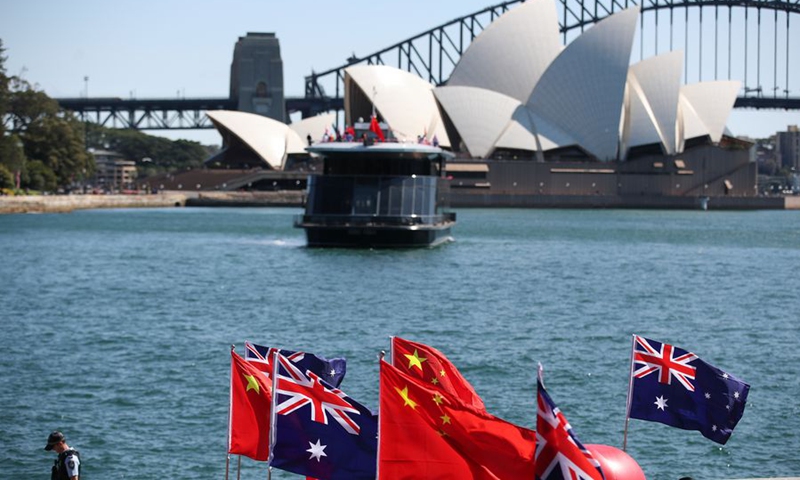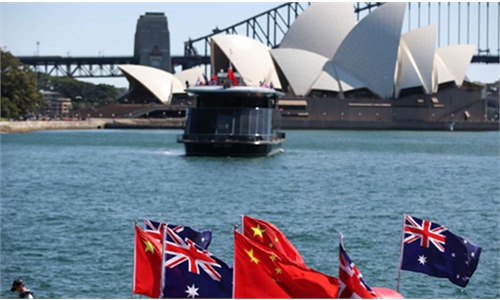
Chinese and Australian national flags are seen at an event in Sydney, Australia. File photo: Xinhua
The trade ministers of Australia, Japan and India met virtually on Tuesday. The ministers instructed their officials to promptly hammer out details for an initiative to strengthen supply chains for launch later this year, according to a joint statement, the NDTV reported.
The development has been widely seen as a trilateral effort to counter China's economic influence in the region and to reduce their dependence on trade with China. It is worth noting that the geopolitical consideration behind the plan to strengthen supply chains may be much greater than its economic significance.
While there is indeed a need for countries to cooperate on economic and trade recovery after taking a hard hit from the coronavirus pandemic, it would be difficult for the three countries to form a closed loop of supply chain. This is because the economies of Japan, India, and Australia are not highly complementary to each other by many measures, leaving limited room for a trilateral supply chain cooperation.
Even if the three parties form some sort of supply chain cooperation driven by government-backed incentives, its economic scale may still fail its geopolitical intentions considering the trade volume levels among the three countries.
Statistics showed that bilateral trade between India and Japan stood at $17.63 billion in 2018/19; two-way trade between Japan and Australia was valued at $88.5 billion in 2018/19; and bilateral trade between Australia and India was around $23 billion in 2019. By comparison, China's trade with Australia alone totaled nearly $160 billion last year.
Australia has reportedly signed a preliminary deal to supply India with critical minerals needed for the new-energy economy. The Australian side may pin its trade hope on India - which is said to overtake China as the most populous country in the world very soon - after its relationship with China soured.
Yet, it seems that Australia may have missed an important piece of fact, that is, India's industrialization and consumer market are not enough to undertake China's role in the value chains connecting the developed world. There is no denying that India is seen as a promising market, but also undeniably, it will take time for the South Asian country to turn its young demographics into real wealth. And India may need even more time to recover as its economy suffered devastating impact from the pandemic in the second quarter of this year. On the Australian side, however, given the reckless and continuous political provocations by its politicians against China, its economy cannot waste time on waiting for India to catch up.
Such time mismatch is the fundamental reason why their trade and economic ties has been developing relatively slowly over the years, which is also why the so-called Indo-Pacific supply chain won't be Australia's pivot to offset its economic reliance on China.
From China's perspective, a new supply chain system, if worked out by the three countries, is still a welcome development, which will naturally seek to integrate into the Asian value chain. And whether the name of the regional industrial chain is called Indo-Pacific or Asian, a detachment from China would be unthinkable.



